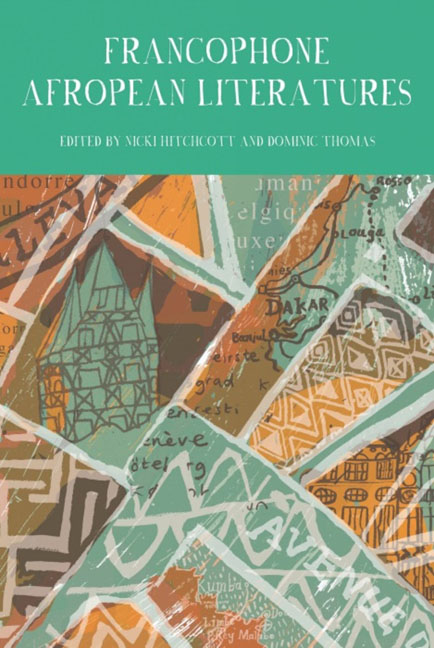Book contents
- Frontmatter
- Contents
- Introduction: Francophone Afropeans
- Essays
- Afropeanism and Francophone Sub-saharan African Writing
- The Transatlantic Poetics of Fatou Diome
- Corps Sans Titre: ‘Fleshiness’ and Afropean Identity in Bessora's 53 Cm
- Already Here: Sami Tchak's Afropean Generation
- Paris Polar: Afropean Noir in the City of Light
- Mapping Afropea: The Translation of Black Paris in the Fiction of Alain Mabanckou
- Relighting Stars and Bazaars of Voices: Exchange and Dialogue in Leonora Mianos Tels Des astres eteints and Alain Mabanckous Black Bazar
- Sex and the Afropean City: Léonora Miano's Blues Pour Élise
- Towards an Afropean Cosmopolitanism: Hospitality, Friendship and the African Immigrant
- Afropean Masculinities as bricolage
- Short Stories
- Notes on Contributors
- Index
Already Here: Sami Tchak's Afropean Generation
from Essays
- Frontmatter
- Contents
- Introduction: Francophone Afropeans
- Essays
- Afropeanism and Francophone Sub-saharan African Writing
- The Transatlantic Poetics of Fatou Diome
- Corps Sans Titre: ‘Fleshiness’ and Afropean Identity in Bessora's 53 Cm
- Already Here: Sami Tchak's Afropean Generation
- Paris Polar: Afropean Noir in the City of Light
- Mapping Afropea: The Translation of Black Paris in the Fiction of Alain Mabanckou
- Relighting Stars and Bazaars of Voices: Exchange and Dialogue in Leonora Mianos Tels Des astres eteints and Alain Mabanckous Black Bazar
- Sex and the Afropean City: Léonora Miano's Blues Pour Élise
- Towards an Afropean Cosmopolitanism: Hospitality, Friendship and the African Immigrant
- Afropean Masculinities as bricolage
- Short Stories
- Notes on Contributors
- Index
Summary
The notion of Afropeanness, as developed by Léonora Miano in Afropean Soul et autres nouvelles [Afropean Soul and Other Stories] (2008), Tels des astres éteints [Like Extinguished Stars] (2008) and Blues pour Élise [Blues for Elise] (2010), suggests the possibility of a black French presence that has shed its association with foreignness to become a fully recognized part of the French nation, and indeed of Europe. In Miano's work, the representation of Afropean characters invites understanding and acceptance; she writes that her texts ‘souhaitent présenter au monde des personnages noirs dans lesquels on trouverait toujours un peu de soi–même d'où qu'on vienne’ [wish to show the world black characters in which people could always find a bit of themselves, no matter where they come from] (2008: 86) and that her novel Tels des astres éteints aims to ‘poser la question de la couleur dans un contexte français, mais sans vouloir culpabiliser personne’ [pose the question of colour in a French context, but without wanting to blame anyone] (2008: 87). This view of Afropeanness as an invitation to greater inclusivity is reflected in the title story of Afropean Soul, in which the French political climate produces an increasingly narrow and rigid view of national identity, while the Afropean protagonist represents an essentially non–confrontational, rational and tolerant orientation to racial and ethnic differences.
Questions about blackness and belonging – who belongs to France? on whose terms? – are posed in a significantly more ambivalent and defiant voice in Place des fêtes (2001) by the Togolese author Sami Tchak, a text that Alain Mabanckou calls ‘le roman le plus hardi, le plus iconoclaste de la littérature subsaharienne francophone contemporaine’ [the boldest, most iconoclastic novel of contemporary francophone sub–Saharan literature] (Mabanckou, 2011a) and that Boniface Mongo–Mboussa heralded as the forerunner of an emerging ‘littérature “black” ou “euroblack”’ whose authors are ‘à la fois d'ici et de là–bas’ [at once from here and from over there] (Mongo–Mboussa, 2005: 115). While Miano's Afropean characters seem designed to encourage readers from a wide variety of backgrounds to sympathize or identify with them, Place des fêtes creates a much more perplexing reading experience, beginning with the fact that neither the Afropean narrator nor anyone else in the text is given a proper name.
- Type
- Chapter
- Information
- Francophone Afropean Literatures , pp. 64 - 80Publisher: Liverpool University PressPrint publication year: 2014



